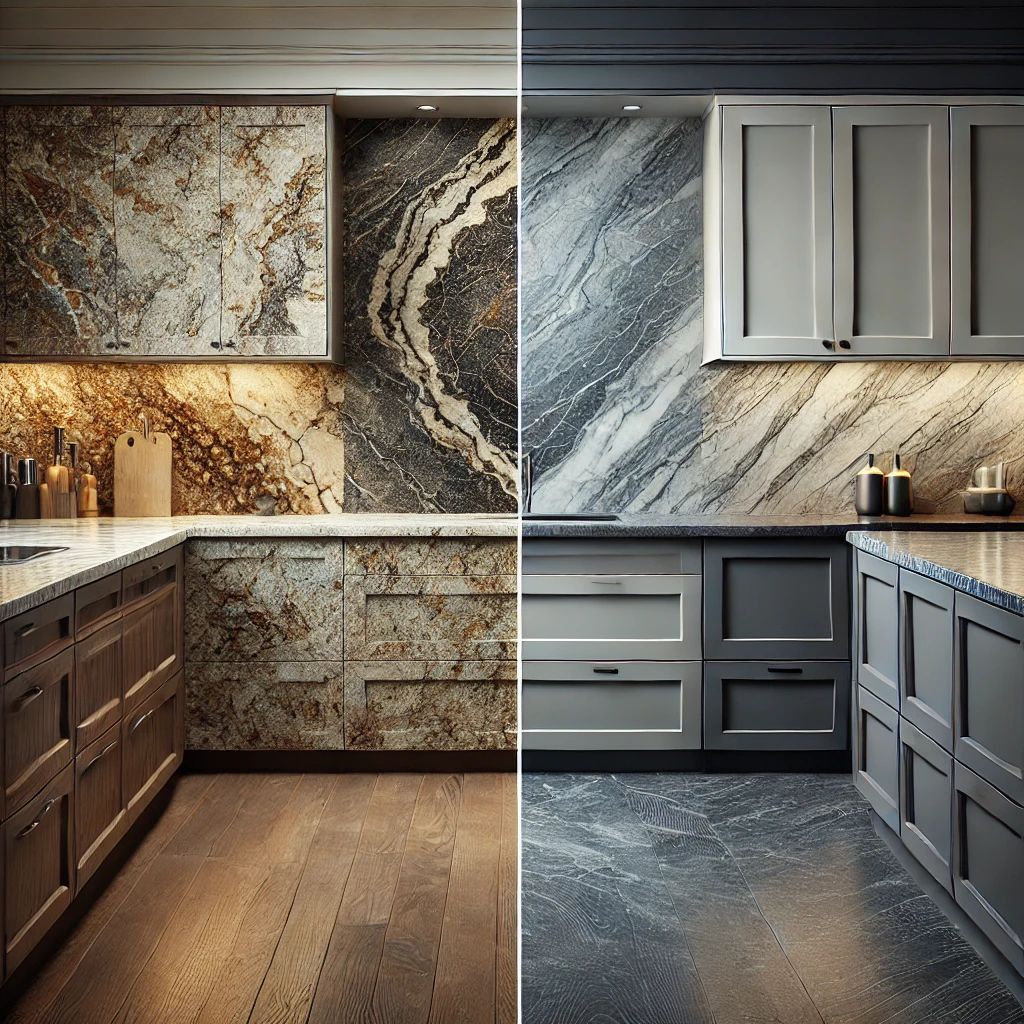
When planning a kitchen renovation or building a new home, one of the most important decisions you'll face is choosing the right granite countertop
When planning a kitchen renovation or building a new home, one of the most important decisions you’ll face is choosing the right granite countertop. Among the options available, two stand out: natural granite and engineered granite. Each has its strengths and limitations, but which is better for your kitchen?
In this article, we’ll explore the key differences between natural and engineered granite countertops, comparing their durability, aesthetics, cost, and maintenance. By the end, you’ll be better equipped to make the right choice for your lifestyle and kitchen design.

What Is a Granite Countertop?
A granite countertop is a surface made from granite, a durable stone known for its rich textures and resistance to heat and scratches. However, not all granite is the same. The two primary types available in the market are:
- Natural Granite: Quarried directly from the earth, cut into slabs, and polished for installation.
- Engineered Granite: Made from crushed granite particles bound with resin and pigments to form slabs.
Both serve as stylish and practical kitchen countertop solutions, but they differ in composition, appearance, and care requirements.
Understanding Natural Granite Countertops
Natural granite is 100% stone, formed deep within the Earth and harvested through quarrying. Each granite slab is unique, with mineral veining, colors, and movement that make it a one-of-a-kind work of art.
Pros of Natural Granite:
- Unique patterns and natural beauty
- High heat and scratch resistance
- Excellent durability for heavy-use kitchens
- Boosts resale value due to its authenticity
Cons:
- Requires granite countertop maintenance including periodic sealing
- Can have natural imperfections or fissures
- Limited availability in specific colors or patterns
Understanding Engineered Granite Countertops
Engineered granite, also known as granite composite, is manufactured using granite stone dust mixed with resin. The result is a uniform slab that mimics the look of natural granite but with added benefits from its synthetic components.
Pros of Engineered Granite:
- Consistent appearance across slabs
- More resistant to staining and bacteria
- Usually doesn’t require sealing
- Wider variety of colors and styles
Cons:
- Less natural feel and look compared to real stone
- May be less heat-resistant due to resin content
- Not considered “pure stone” by some buyers
Comparing Performance and Durability
Let’s see how natural and engineered granite measure up in everyday use:
| Feature | Natural Granite | Engineered Granite |
|---|---|---|
| Heat Resistance | Excellent | Good (varies by resin) |
| Scratch Resistance | Excellent | Good |
| Stain Resistance | Requires sealing | Naturally non-porous |
| Durability | 20+ years | 15–20 years |
| Chipping | Moderate (natural fissures) | Low due to uniformity |
If you’re cooking frequently or have a busy kitchen, natural granite may handle heat and heavy wear better over time. However, engineered granite can offer easier upkeep and better stain protection for casual use.
Aesthetics and Granite Countertop Colors
Both options come in a variety of tones and patterns, but the differences in sourcing affect visual diversity.
Natural Granite Slabs:
- Formed naturally, resulting in one-of-a-kind veining and textures
- Available in classic tones like Black Galaxy, Santa Cecilia, or White Ice
- May require visual inspection before purchase to ensure pattern match
Engineered Granite:
- Offers a consistent look across slabs
- Broader granite countertop colors, including more modern or uniform shades
- Ideal for minimalist or contemporary kitchen countertop design
If uniqueness is your top priority, natural granite is the winner. If consistency and design control matter more, engineered granite offers more flexibility.
Granite Countertop Maintenance and Cleaning
Natural Granite Care:
- Requires sealing every 1–2 years
- Daily granite countertop cleaning with pH-neutral soap
- Avoid acidic or abrasive cleaners
Engineered Granite Care:
- Minimal maintenance due to resin binders
- No sealing typically required
- Still requires regular cleaning to maintain luster
👉 Why clean after countertop installation?
Granite Countertop Prices and Installation Costs
Price is often a deciding factor for many homeowners. Here’s what to expect:
| Type | Material Price (per sq. ft.) | Installation (per sq. ft.) |
|---|---|---|
| Natural Granite | $50–$150 | $35–$85 |
| Engineered Granite | $40–$100 | $35–$85 |
While granite countertop prices for engineered options may be lower, natural granite typically adds more resale value due to its prestige and natural composition.
Countertop Installation Considerations
Whether you choose natural or engineered granite, countertop installation is critical to ensure longevity and performance.
Installation Tips:
- Make sure the cabinets are leveled and reinforced
- Account for sink and cooktop cutouts
- Review slab templates and edge profiles
👉 What to Note During Countertop Installation?
Poor installation can lead to seam issues, stress cracks, and water damage.
Should You Hire a Professional?
Absolutely. While DIY installations may save costs upfront, they often lead to mistakes that reduce the countertop’s lifespan or appearance.
Benefits of Hiring a Professional:
- Accurate measuring and templating
- Seamless installation and joint work
- Correct sealing for stain prevention
- Expert advice on long-term care
👉 How Do You Choose the Best Countertop Installation Provider?
Professional installers not only protect your investment but also help you avoid costly granite countertop repair down the road.
Final Verdict: Which Granite Countertop Is Better?
Choose Natural Granite If:
- You want a one-of-a-kind stone with unique beauty
- Your kitchen sees high heat and heavy use
- You’re willing to reseal occasionally
- You want to add maximum resale value
Choose Engineered Granite If:
- You prefer uniform patterns and color consistency
- Low maintenance is your top priority
- You’re designing a modern or minimalist kitchen
- You want a broader color selection
Conclusion: Make the Right Choice for Your Home
Ultimately, the decision between natural and engineered granite countertops comes down to your needs, lifestyle, and budget. Natural granite brings unmatched elegance and heat resistance, while engineered granite offers easy upkeep and modern design flexibility.
Whichever you choose, ensure a professional countertop installation, use proper granite countertop cleaning techniques, and stay on top of basic maintenance to enjoy a beautiful, durable surface for years to come.
Key Takeaways:
- Natural granite is unique and heat-resistant, perfect for traditional, high-use kitchens.
- Engineered granite is uniform and low-maintenance, ideal for modern designs.
- Budget, aesthetics, and functionality should guide your decision.
- Always hire a professional for reliable countertop installation.

